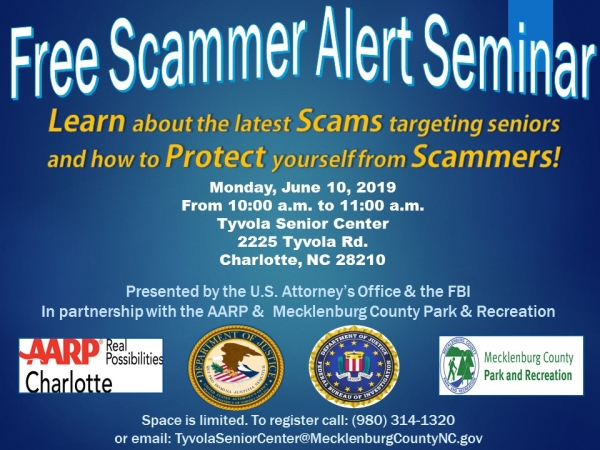Related Content
Press Release
CHARLOTTE, N.C. – An Ohio man was found guilty late yesterday for his role in a $7 million telemarketing scheme that defrauded primarily elderly victims in the United States from call centers in Costa Rica.
Assistant Attorney General Brian A. Benczkowski of the Justice Department’s Criminal Division, U.S. Attorney R. Andrew Murray of the Western District of North Carolina, Inspector in Charge David M. McGinnis of the U.S. Postal Inspection Service’s Charlotte Divison, Acting Special Agent in Charge William Cheung of the IRS Criminal Investigation’s (CI) Cincinnati Field Office, Special Agent in Charge Matthew D. Line of the IRS CI Charlotte Field Office and Special Agent in Charge John Strong of the FBI’s Charlotte Field Office made the announcement.
Following a five-day jury trial, Donald Dodt, 76, originally of Cleveland, Ohio, was convicted of one count of conspiracy to commit wire fraud and mail fraud, two counts of mail fraud, eight counts of wire fraud, one count of conspiracy to commit international money laundering and 10 counts of international money laundering.
According to evidence presented at trial, Dodt worked in a call center in Costa Rica in which co-conspirators, who posed as representatives of the District of Columbia Department of Consumer and Regulatory Affairs and federal agencies, including the U.S. Federal Trade Commission, and who also posed as federal judges, contacted victims in the United States — primarily senior citizens – to tell them that that they had supposedly won a substantial “sweepstakes” prize. After convincing victims that they stood to receive a significant financial reward, the co-conspirators told victims that they needed to make a series of up-front cash payments before collecting, purportedly for items like insurance fees, taxes and import fees. Co-conspirators used a variety of means to conceal their true identity, such as Voice over Internet Protocol (VoIP) services provided by Dodt that made it appear that they were calling from Washington, D.C., and other places in the United States.
As the evidence presented at trial illustrated, Dodt was an integral part of this scheme in that he knowingly provided services that were necessary for the scheme to operate and that facilitated the concealment and, ultimately, success of the scheme for many years. Specifically, Dodt provided and maintained VoIP phone technology and assigned phone numbers associated with locations in the United States through which members of the conspiracy were able to make the fraudulent calls to victims in the United States and conceal their identities and location. Dodt specifically assigned virtual phone numbers with area codes associated with Washington, D.C., to make it appear that the calls originated from within the United States and that also bolstered conspirators’ misrepresentations that they were representatives of government agencies located in Washington. Dodt also warned the co-conspirators if certain numbers were “hot” – i.e., there were customer complaints or law enforcement inquiries – and replaced those phone numbers with new phone numbers that the co-conspirators then used in furtherance of the scheme, the evidence showed.
Dodt and his conspirators stole more than $7 million from victims, the evidence showed.
This case was investigated by the U.S. Postal Inspection Service, Internal Revenue Service Criminal Investigation and the FBI with assistance from the Federal Trade Commission and U.S. Immigration and Customs Enforcement’s Homeland Security Investigations. The case is being prosecuted by Fraud Section Trial Attorneys William Bowne, Jennifer Farer and Philip Trout. The U.S. Attorney’s Office for the Western District of North Carolina provided substantial assistance with this matter.
The Western District’s Elder Justice Initiative
In March 2019, the U.S. Attorney’s Office and the FBI in North Carolina announced the Western District’s Elder Justice Initiative, which aims to combat elder financial exploitation by expanding efforts to investigate and prosecute financial scams that target seniors; educate older adults on how to identify scams and avoid getting ripped off by scammers; and promote greater coordination with law enforcement partners.
In addition to the criminal prosecution of perpetrators, the Elder Justice Initiative aims to raise awareness through outreach, including a series of seminars to educate older adults and prevent victimization. Our next such seminar is scheduled for June 10, 2019, at 10:00 a.m. at the Tyvola Senior Center. This seminar is free of charge.

Among the topics covered will be financial fraud and scams targeting seniors, including:
The seminar will also focus on prevention and how to avoid falling victim to a financial scam. Some of such tips on preventing becoming a victim of fraud are:
For more information about the Elder Justice Initiative, please visit: https://www.justice.gov/usao-wdnc/elder-justice-initiative. To view our Public Service Announcement, please visit: https://youtu.be/qBGGAA7Mxbo